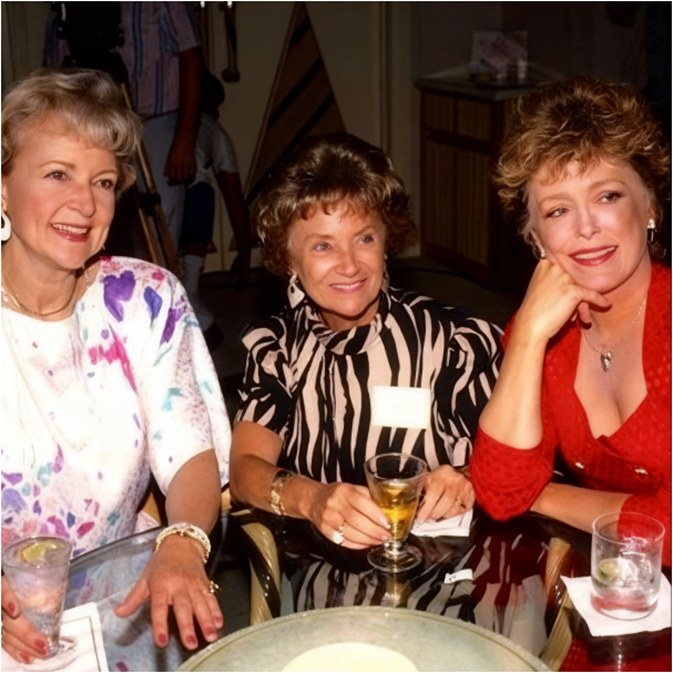Prologue — The Promise of One More Laugh
It was supposed to be magic.
In early 1994, NBC executives began drafting plans for what they called “The Golden Reunion” — a televised special celebrating the women who had changed the landscape of television forever.
Seven years after The Golden Girls had wrapped, America was still quoting them, still watching reruns every night, still craving that laughter that came from something rare — friendship made visible.
Letters went out to all four stars: Bea Arthur, Betty White, Rue McClanahan, and Estelle Getty.
The plan was simple — a reunion filmed live at CBS Studio Center in Los Angeles, with a new script, a dinner-table set rebuilt from the original blueprints, and an audience ready to cheer the women back into history.
The response from fans was electric.
The studio received more than 12,000 requests for audience tickets in the first two weeks — an unprecedented number for a nostalgia special.
“America was ready to laugh again,” one NBC publicist recalled. “We all thought this would be their victory lap.”
But as plans solidified, something else began to unravel.
The excitement faded into hesitation. Calls weren’t returned. Letters went unanswered.
By summer, the reunion was gone — erased without explanation.
The Dream That Almost Happened
Production designer Hal Kanter still had the sketches — the old kitchen, perfectly reconstructed down to the worn linoleum and yellow coffee mugs. He had measured every inch of the original set, planning to surprise the women with a faithful recreation.
“They were supposed to walk in and see it exactly as they’d left it,” Kanter said. “We wanted that gasp, that laughter, that flood of memory.”
Rue McClanahan was the first to sign a soft commitment letter. She was enthusiastic, sending a handwritten note to the producers:
“If we do this, let’s make it honest — laughter with truth in it, just like before.”
Betty White followed soon after. Her manager responded warmly, noting that Betty had “a soft spot for any excuse to be back with her girls.”
Even Estelle Getty, whose health was beginning to decline, was hopeful. “She was fragile,” said her son, Carl, “but when we mentioned the reunion, her eyes lit up. She said, ‘Tell them Sophia’s still got it.’”
It was Bea Arthur’s letter that came last — and quietly changed everything.
The Letter Bea Never Intended to Be Public
Bea Arthur’s response was polite, brief, and final.
Typed on personal stationery and sent through her agent, it read in part:
“The show ended at the right time. I love those women, and I’m proud of what we made. But some things are better remembered than repeated.”
She signed it simply, Bea.
To the network, it was a no.
To her friends, it was something harder — a door closing.
Rue reportedly called Bea after hearing the news.
“She tried to convince her,” a crew member remembered. “Rue said, ‘Come on, Bea — we’ll make it fun, no pressure.’ And Bea said, ‘You don’t get it. Dorothy’s story is finished. So is mine.’”
Behind the professionalism, there was something else — exhaustion, fear, perhaps even grief. Bea had left The Golden Girls in 1992 not out of anger, but because she felt something in her had gone quiet. “It wasn’t about anyone else,” she told an interviewer years later. “It was about knowing when to walk away.”
That choice, once again, defined what would have been her final reunion.
The Silence Between Friends
As the project faded, so did contact between the women. They weren’t feuding — not in the way tabloids liked to imagine — but time and life had started pulling them in different directions.
Betty stayed busy with guest appearances and sitcoms. Rue focused on stage work in New York. Estelle’s health was beginning to falter. And Bea had retreated from Hollywood almost entirely, choosing a quieter life in Brentwood filled with books, her dogs, and early morning walks.
“They still loved each other,” said director Terry Hughes. “But after you’ve shared that much laughter, sometimes silence is the only thing that feels honest.”
Still, the affection never truly faded. When Bea’s 1993 Broadway show Bea Arthur on Broadway: Just Between Friends premiered, both Rue and Betty sent flowers — separately, but with nearly identical notes:
“Break a leg, honey — the girls are with you.”
Bea kept both cards in her dressing room mirror until the show’s final performance.
The Network’s Quiet Cover-Up
Inside NBC, the cancellation of The Golden Reunion was never officially announced.
Publicists simply “moved on,” pretending the idea had been a rumor. But memos recovered decades later reveal how close it truly came.
One, dated June 2, 1994, reads:
“All four principals initially expressed interest. Final confirmation pending Arthur’s agent. Proceed with contingency plan in case of health-related delays (Getty). Target airdate: Thanksgiving 1994.”
Another, dated July 8, carries only five words:
“Project halted. Creative conflict unresolved. Confidential.”
According to one executive assistant, there was no conflict — only heartbreak. “They didn’t want to replace Estelle or pretend she was fine,” she said. “They didn’t want a version that wasn’t them.”
And so, the special that could have reunited them in front of millions vanished — not with scandal, but with quiet understanding.
Rue’s Confession
Years later, in her 2007 memoir My First Five Husbands… and the Ones Who Got Away, Rue hinted at that lost reunion. She wrote:
“We were offered more than anyone will ever know. But sometimes, the laughter doesn’t belong to you anymore. It belongs to time — and you have to let it keep it.”
During one book signing, when asked if she regretted not doing it, Rue smiled wistfully. “No,” she said. “If we’d done it, it would’ve been about nostalgia. What we had was real. And real things end quietly.”
Betty’s Final Word on It
In 2011, months before her 90th birthday, Betty White was asked again about that fabled 1994 reunion.
Her response was both simple and devastating.
“We talked. We wanted it. But life has a way of saying ‘not now.’ Maybe it was never supposed to happen. Maybe the memory is the reunion.”
She paused, then added:
“You know, sometimes the best goodbyes aren’t filmed.”
The Hidden Reason — Life Itself
Hollywood thrives on control — scripts, edits, outcomes. But The Golden Girls had always been about what couldn’t be controlled: aging, friendship, the quiet ache of loss.
By 1994, each woman was confronting her own version of that truth.
Bea was protecting her peace.
Rue was fighting exhaustion after a decade on stage.
Estelle was facing confusion and fragility.
Betty was watching time take the people she loved.
“It wasn’t ego,” said Bea’s son, Daniel. “It was life. They had already given the world everything.”
When producers tried to revive the idea in 1996 as a charity special, Bea’s representative sent a short, handwritten note:
“Please let the girls rest.”
The Forgotten Set
For nearly a decade, the reconstructed kitchen built for the cancelled special sat disassembled in a Burbank storage unit — the yellow chairs stacked, the table folded, the fake cheesecake plates still labeled with the women’s initials.
In 2005, the set was quietly donated to a prop museum in Culver City.
The curator later revealed that one small drawer from the prop counter still contained a note.
It read: “Thank you for being our home.”
No one knows who wrote it.
The Reunion That Happened Anyway
Though the 1994 reunion never aired, something deeper happened in private.
That summer, Betty, Rue, and Bea met for lunch at a small restaurant in Santa Monica — a meeting that only came to light years later through an old staff receipt.
The three of them sat for nearly three hours, laughing, reminiscing, occasionally falling into quiet.
When asked what they talked about, Betty once hinted: “Everything and nothing. Mostly just… us.”
Estelle couldn’t attend. She sent a note instead, written shakily but full of heart:
“Still your Ma. Always.”
That was their reunion — no cameras, no makeup, no applause. Just love.
Epilogue — The Silence That Never Faded
Today, when fans look back on that lost reunion, they see it for what it was: not a missed opportunity, but a testament to grace.
It didn’t end in bitterness. It ended in truth.
Because sometimes the loudest closure isn’t the one the world watches — it’s the one shared between friends who already know how the story ends.
And maybe, in some quiet corner of Hollywood, where four chairs once stood side by side beneath warm studio light, there’s still an echo — of laughter, of belonging, of something unfinished yet eternal.
Because The Golden Girls didn’t really say goodbye in 1994.
They simply went silent — and in that silence, their friendship kept speaking.

